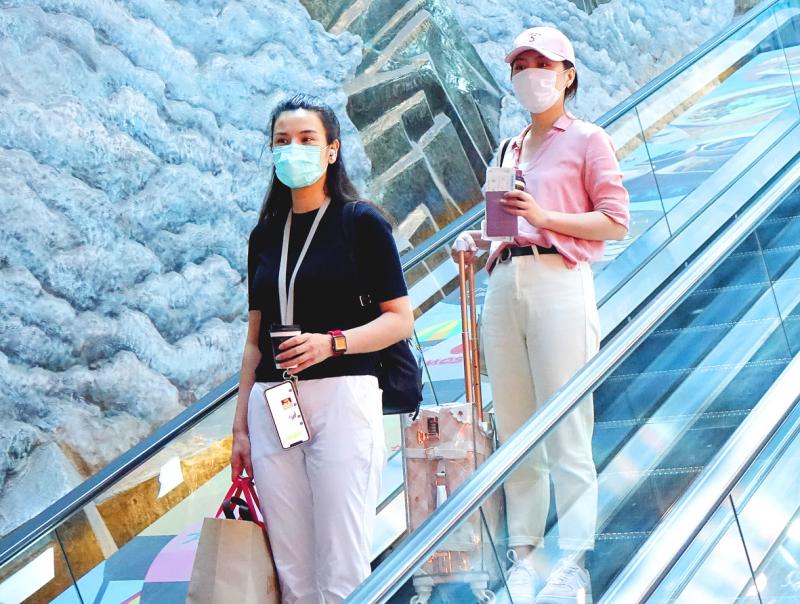Two Chinese reporters yesterday left Taiwan after the government revoked their accreditation and ordered them to leave amid a probe into allegations that several Chinese media outlets have set up studios and produced political talk shows in Taiwan.
The two reporters — Ai Kezhu (艾珂竹) and Lu Qiang (盧薔) — worked for Fujian Province-based Southeast Television and arrived in Taiwan in December last year.
The Mainland Affairs Council has launched an investigation after local media reported that Chinese broadcasters — including China Central Television, Southeast Television and FJTV — had set up studios in Taipei and produced political talk shows.

Photo: Chu Pei-hsiung, Taipei Times
Council Deputy Minister Chiu Chui-cheng (邱垂正) on Thursday said that the council had been keeping a close watch on Chinese reporters based in Taiwan, and that it maintains close contact with the Ministry of Culture to deal with Chinese journalists if they are involved in any breaches of the nation’s laws.
Taiwan in 2000 opened up to Chinese reporters based on a policy of promoting journalism exchanges across the Taiwan Strait, allowing them to cover local news.
If TV news programming had been produced in Taiwan, then the Chinese journalists must have contravened the law, Chiu said.
In such cases, the government can revoke their accreditation and work permit, and impose entry restrictions according to the Items of Note for Reporters from the Mainland Area Reporting in Taiwan (大陸地區新聞人員進入臺灣地區採訪注意事項), the Act on Permission for Entrance of People of the Mainland Area Into the Taiwan Area (大陸地區人民進入臺灣地區許可辦法) and the Act Governing Relations Between the People of the Taiwan Area and the Mainland Area (臺灣地區與大陸地區人民關係條例), he said.
However, the council did not confirm that the journalists had been expelled because of the content of the programs.
The Ministry of Culture said that it sent a formal notice to Southeast Television on Tuesday, demanding changes to its operations in Taiwan.
The ministry did not say how the TV station had responded and why the journalists were ordered to leave in the same week as the the warning was issued.
Ai yesterday said that Southeast Television had been operating in Taiwan for 12 years and every member of the media outlet had complied with Taiwanese laws.
“Our job in Taiwan is to interview people and ask questions; we don’t make TV programs in Taiwan,” Ai said.
Southeast Television journalists had not made any appearances on political talk shows or offered any personal opinions, she said.
Separately yesterday, China’s Taiwan Affairs Office spokeswoman Zhu Fonglian (朱鳳蓮) said that the Democratic Progressive Party (DPP) authorities should cease their “arbitrary oppression” of the journalistic freedom of Chinese reporters or “shoulder the consequences.”
Driving Lu and Ai out of Taiwan highlighted the DPP’s hypocrisy regarding journalistic freedom, she said.
The objective reporting of Taiwanese issues by Chinese reporters over many years had helped Chinese viewers better understand Taiwan, Zhu said, adding that the rights of Chinese reporters should be protected and respected.

Right-wing political scientist Laura Fernandez on Sunday won Costa Rica’s presidential election by a landslide, after promising to crack down on rising violence linked to the cocaine trade. Fernandez’s nearest rival, economist Alvaro Ramos, conceded defeat as results showed the ruling party far exceeding the threshold of 40 percent needed to avoid a runoff. With 94 percent of polling stations counted, the political heir of outgoing Costa Rican President Rodrigo Chaves had captured 48.3 percent of the vote compared with Ramos’ 33.4 percent, the Supreme Electoral Tribunal said. As soon as the first results were announced, members of Fernandez’s Sovereign People’s Party

MORE RESPONSIBILITY: Draftees would be expected to fight alongside professional soldiers, likely requiring the transformation of some training brigades into combat units The armed forces are to start incorporating new conscripts into combined arms brigades this year to enhance combat readiness, the Executive Yuan’s latest policy report said. The new policy would affect Taiwanese men entering the military for their compulsory service, which was extended to one year under reforms by then-president Tsai Ing-wen (蔡英文) in 2022. The conscripts would be trained to operate machine guns, uncrewed aerial vehicles, anti-tank guided missile launchers and Stinger air defense systems, the report said, adding that the basic training would be lengthened to eight weeks. After basic training, conscripts would be sorted into infantry battalions that would take

GROWING AMBITIONS: The scale and tempo of the operations show that the Strait has become the core theater for China to expand its security interests, the report said Chinese military aircraft incursions around Taiwan have surged nearly 15-fold over the past five years, according to a report released yesterday by the Democratic Progressive Party’s (DPP) Department of China Affairs. Sorties in the Taiwan Strait were previously irregular, totaling 380 in 2020, but have since evolved into routine operations, the report showed. “This demonstrates that the Taiwan Strait has become both the starting point and testing ground for Beijing’s expansionist ambitions,” it said. Driven by military expansionism, China is systematically pursuing actions aimed at altering the regional “status quo,” the department said, adding that Taiwan represents the most critical link in China’s

‘REALLY PROUD’: Nvidia would not be possible without Taiwan, Huang said, adding that TSMC would be increasing its capacity by 100 percent Nvidia Corp CEO Jensen Huang (黃仁勳) on Saturday praised and lightly cajoled his major Taiwanese suppliers to produce more to help power strong demand for artificial intelligence (AI), capping a visit to the country of his birth, where he has been mobbed by adoring fans at every step. Speaking at an impromptu press conference in the rain outside a Taipei restaurant, where he had hosted suppliers for a “trillion-dollar dinner,” named after the market capitalization of those firms attending, Huang said this would be another good year for business. “TSMC needs to work very hard this year because I need a lot